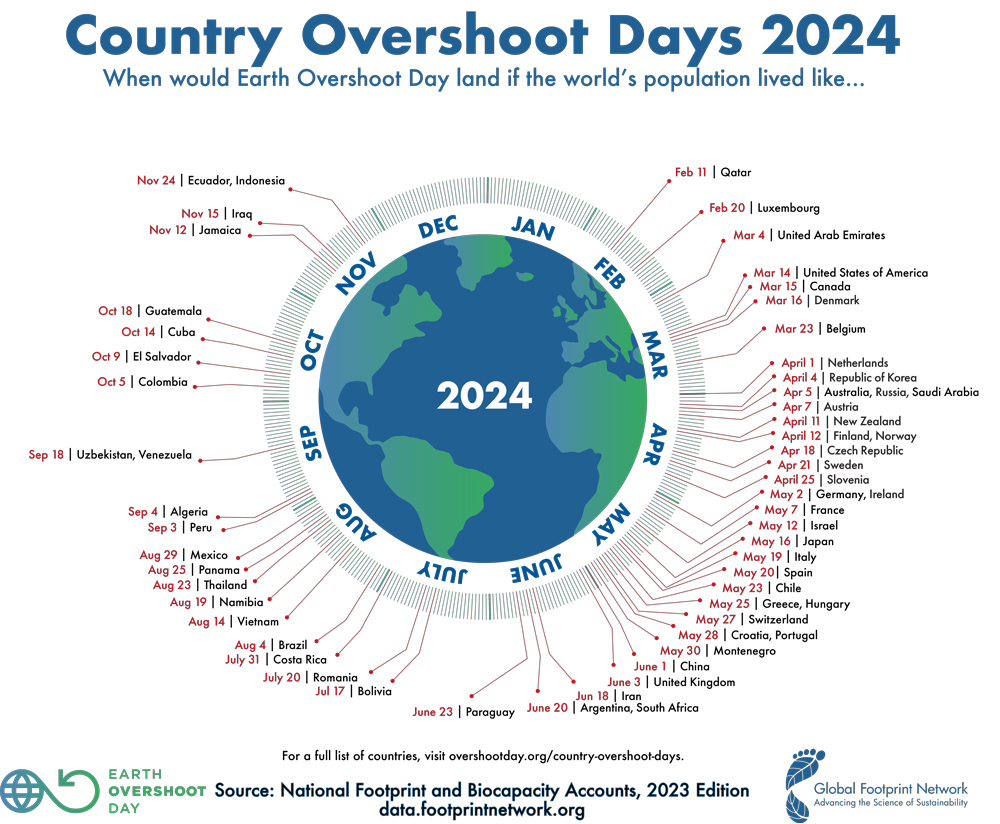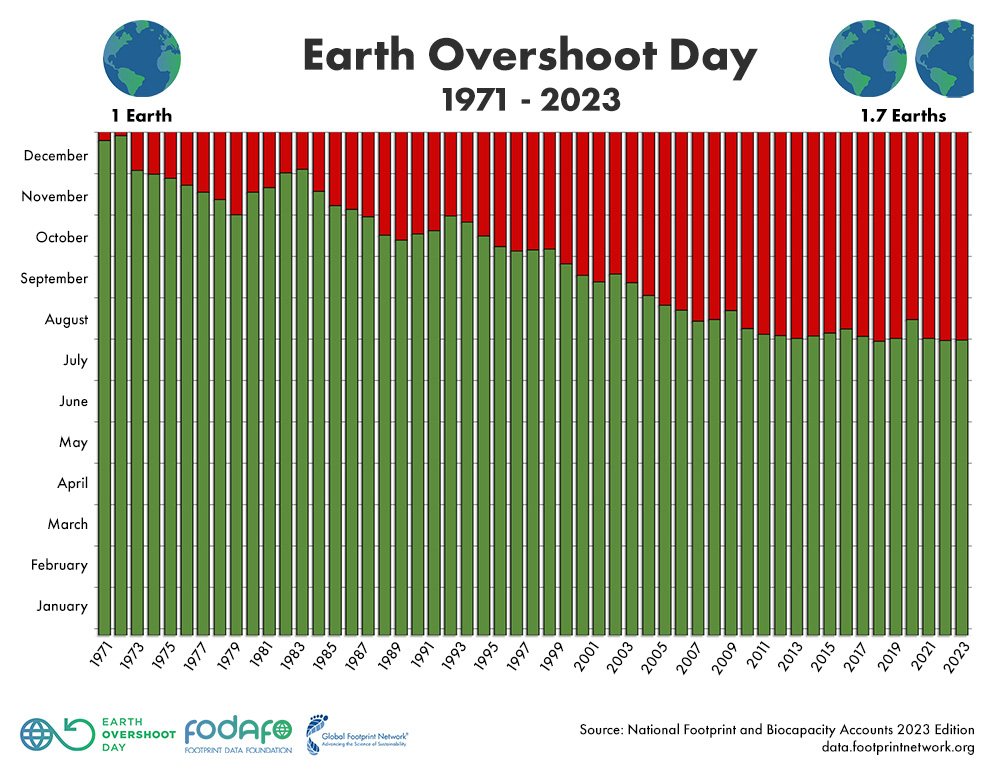When is your Overshoot Day?
Earth Overshoot Day for the planet is coming. This year it's calculated as August 2, 2024.
Earth Overshoot Day is the day each year that marks the date when we have used all the biological resources that the Earth can renew during the entire year.
A "Country" Overshoot Day reflects the ecological footprint of a country by comparing "the population’s demand and the nation’s biocapacity." For example Canada's "Overshoot Day" was back on March 15, 2024.
But when was YOUR OWN "overshoot day"? In other words, what day would Earth Overshoot Day land if the world's population lived like you?
Figure 1 - Countrey Overshoot Days 2024

Make note that Israel's "Overshoot Day" the next one up on May 12, 2024 and China's on June 1st, 2024, and these days are opportunities to speak up on consumerism. Because this calculation changes with each year, so you can see the current year's calculation of Earth Overshoot Day here.
Inspiration for this concept grew from people much like Friedrich Schmidt-Bleek with the Factor10 groundwork laid in the 1990s here. Any movement that puts the concept of GDP back a notch on the priority list however is on the right side of history. Doughnut Economics is one of the most popular theories that decouples GDP from our economy, stating that we have to be "agnostic to growth" in order to "meet the needs of all people within the means of the living planet."
Earth Overshoot is now "a thing" and a good concept, not to shame ourselves, but to wake ourselves up. It can reframe our wants and desires in Grey Bruce. From here, whenever we hear about "Canada's growing energy needs" we should replace it with the sentence "Canada's growing energy wants". Whenever we hear about "Natural Gas" we should replace the term with "Fossil Gas."
The world's consumption is so rampant that at the current pace (even amalgamated with all sustainably-living countries around the world) we apparently need 1.7 Earths in 2024 to sustainable provide resources for it. Reduce is one of the three R's after all, is it not?
Figure 2 - Earth Overshoot Day's progress

Do we want to unite and bring awareness here in our communities?
We do have an opportunity to fix this. Uniting behind this common goal to REDUCE is what we are calling the "Group Economy":
- Co-Housing
- CSA's
- Advocate Groups for Universal Basic Income
- Repair Cafés
- Doughnut Economy groups
- Degrowth Collective
- Transition Town
- Social Enterprises
- Conservancies (Bruce Trail, EBC, NCC, etc)
- Ontario's Greenbelt
"The thing about urbanization is that although we plan for only 25 or 30 years, it's permanent."
Victor Doyle, former lead planner of the Greenbelt plan.
From a personal point of view, it can also be as easy as speaking with your wallet. By thrifting or sharing tools, in effect you are refusing to spend your money in the growth economy. If you're able, using public or active transport or car-sharing and carpooling adds up... The "incrementalism" around us lessening our impact is indeed happening, and although sometimes it may not seem like much when you're hanging out in civic spaces or when you pass by a Costco, we are conspicuous by our absence in the growth economy.
What are some of the risks involved, if we don't REDUCE?
- continued deforestation
- reduced resilience to climate change
- alienates us further from nature
- risks biodiversity collapse
- stress on natural storm buffers like wetlands
- risk of high personal debt
- too much waste & ineffective recycling
- poor/failed reconciliation with Indigenous neighbours
- carbon emissions status quo
- fewer skills transferred to youth
- petrochemicals in our food
- microplastics in our food, oceans, bodies
As for climate change, we can adapt if we don't deplete our natural landscapes, but it's folly to think that we can buy our way out of severe weather. We also have to beware of Jevon's Paradox in a way, which is "new modes of economy will lead to an increase in consumption." But most importantly is that Landscape Degredation + Climate Change gives us no chance of survival, while Landscape Resilience + Climate Change gives us a fighting chance. Johan Rockstrom states we need a safe landing after the Climate Crisis fight.
A "concrete" way to advocate for sustainability in Southern Ontario would be to reconsider or advocate against locked-in infrastructure that could harm our communities and natural assets for generations to come. One thing that comes to mind is the Proposed Provincial Planning Statement in Ontario, Bill 185, and the steadfast determination for the Province of Ontario to open up more farmland for development with the construction of Hwy 413.
“Even if we got a car that could drive with no pollution, its impact on land use, its impact on energy consumption at home, its threat to the natural world in terms of consumption of farmland, would still be huge problems we need to solve for climate stability.”
-Shoshanna Saxe
What can we do, and what can mayors and councillors do, if these change become law? A lot of this policy is designed to build expensive houses in the wrong places, under the guise of solving Canada's housing crisis. As recent as March 2024, the premier of Ontario has said the gov't is going to focus on single-detatched housing.
As New Dundee farmer Mark Reusser states in a recent Alliance for Livable Ontario webinar, "Think of the future, do you want to be able to produce food in this province? Do you want to be self-sufficient? We're not self-sufficient currently, we're only getting worse. Look at this place in the context of north America. Southwestern Ontario is this wonderful "Goldilocks zone" with moderate climate, wonderful soils, moderated by three Great Lakes. We can grow a longer list of vegetables, fruits and grains than any place in North America with the exception of California which is dependant on water from somewhere else. Why in the world would you even contemplate sacrificing that for housing and business when there are suitable alternatives galore?"
Taking a Doughnut Economics look at our lifestyles and the system that surrounds us is a wonderful way to sustainable living. If you want to run even more lean, there's also the Degrowth movement, a group and concept that was featured on a recent The Sustainability Project Climate Forum. As local activist Ted Ratcliffe says, "If we don't incorporate degrowth principals now, we'll experience degrowth anyway just not by design."
The first step for most however, is to wake up, so let's promote Earth Overshoot Day.
Leigh Grigg
The Sustainability Project
NOTE: To determine the date of Earth Overshoot Day, the Global Footprint Network, a non-profit organization, combines data and forms the most reasonable assumptions to assess humanity’s resource situation.
